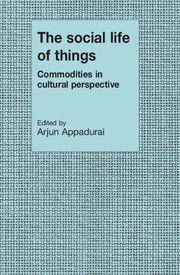Book contents
- Frontmatter
- Contents
- Contributors
- Foreword
- Preface
- Part I Toward an anthropology of thing
- 1 Introduction: commodities and the politics of value
- 2 The cultural biography of things: commoditization as process
- Part II Exchange, consumption, and display
- Part III Prestige, commemoration, and value
- Part IV Production regimes and the sociology of demand
- Part V Historical transformations and commodity codes
- Index
2 - The cultural biography of things: commoditization as process
Published online by Cambridge University Press: 05 June 2014
- Frontmatter
- Contents
- Contributors
- Foreword
- Preface
- Part I Toward an anthropology of thing
- 1 Introduction: commodities and the politics of value
- 2 The cultural biography of things: commoditization as process
- Part II Exchange, consumption, and display
- Part III Prestige, commemoration, and value
- Part IV Production regimes and the sociology of demand
- Part V Historical transformations and commodity codes
- Index
Summary
For the economist, commodities simply are. That is, certain things and rights to things are produced, exist, and can be seen to circulate through the economic system as they are being exchanged for other things, usually in exchange for money. This view, of course, frames the commonsensical definition of a commodity: an item with use value that also has exchange value. I shall, for the moment, accept this definition, which should suffice for raising certain preliminary issues, and I shall expand on it as the argument warrants.
From a cultural perspective, the production of commodities is also a cultural and cognitive process: commodities must be not only produced materially as things, but also culturally marked as being a certain kind of thing. Out of the total range of things available in a society, only some of them are considered appropriate for marking as commodities. Moreover, the same thing may be treated as a commodity at one time and not at another. And finally, the same thing may, at the same time, be seen as a commodity by one person and as something else by another. Such shifts and differences in whether and when a thing is a commodity reveal a moral economy that stands behind the objective economy of visible transactions.
- Type
- Chapter
- Information
- The Social Life of ThingsCommodities in Cultural Perspective, pp. 64 - 92Publisher: Cambridge University PressPrint publication year: 1986
- 2103
- Cited by



